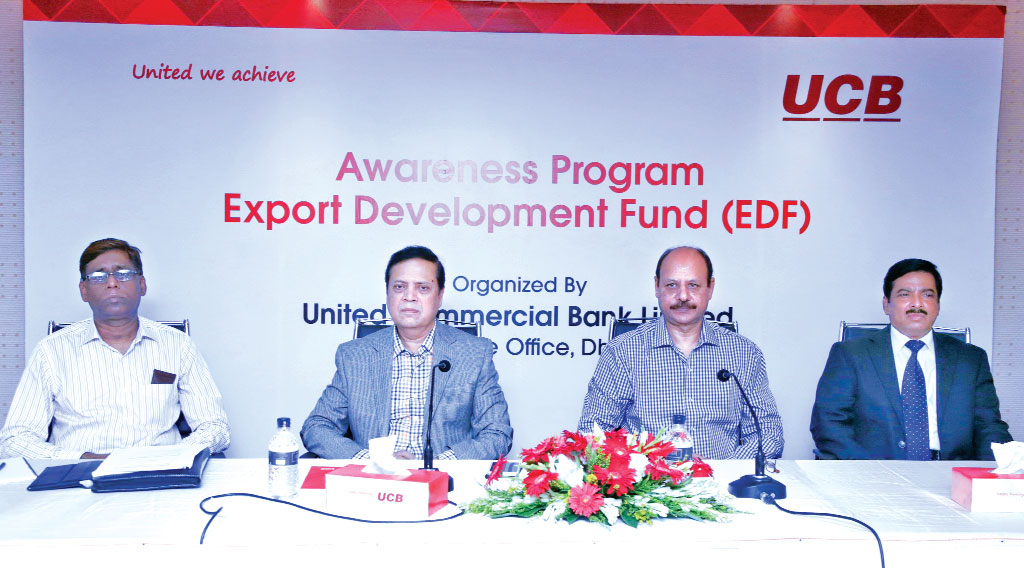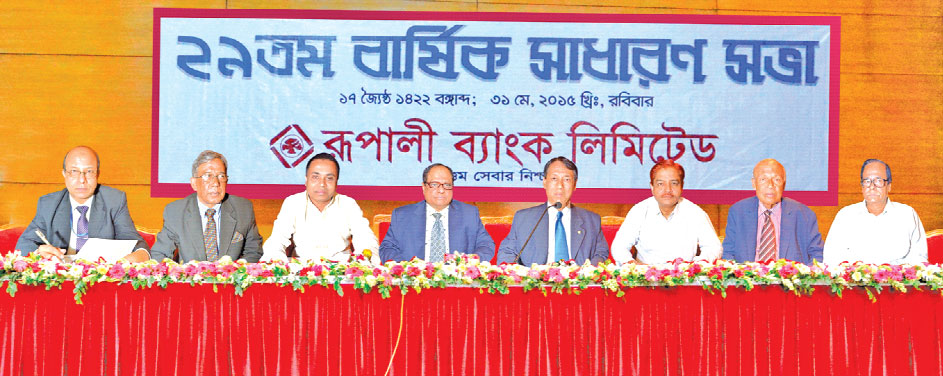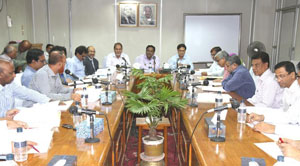Banking
Seminar for creating awareness
 Muhammed Ali, Managing Director of United Commercial Bank Limited (UCB), Kazi Sayedur Rahman, General Manager, FRTMD, Bangladesh Bank, and Mirza Mahmud Rafiqur Rahman, Additional Managing Director of UCB, are seen at a seminar for creating awareness to increase the use of Export Development Fund (EDF), at the bank’s corporate head office in the capital on Saturday.
Muhammed Ali, Managing Director of United Commercial Bank Limited (UCB), Kazi Sayedur Rahman, General Manager, FRTMD, Bangladesh Bank, and Mirza Mahmud Rafiqur Rahman, Additional Managing Director of UCB, are seen at a seminar for creating awareness to increase the use of Export Development Fund (EDF), at the bank’s corporate head office in the capital on Saturday.
29th Annula General Meeting of Rupali Bank
 Manzur Hossain, Chairman, Rupali Bank Limited, attends the 29th Annula General Meeting of the bank at Institute of Diploma Engineers in the capital on Saturday. Managing Director M Farid Uddin, Additional Secretary of the Banking and Finance Division Md. Fazlul Haque and directors of the bank Mohiuddin Faruqui, Prof. Hasibur Rashid and Barrister Zakir Ahammad were also present.
Manzur Hossain, Chairman, Rupali Bank Limited, attends the 29th Annula General Meeting of the bank at Institute of Diploma Engineers in the capital on Saturday. Managing Director M Farid Uddin, Additional Secretary of the Banking and Finance Division Md. Fazlul Haque and directors of the bank Mohiuddin Faruqui, Prof. Hasibur Rashid and Barrister Zakir Ahammad were also present.
Large loan restructuring policy: criticisms and answers
On January 29, Bangladesh Bank issued a new Large Loan Restructuring Policy (LLRP). Concerns have been expressed in some quarters about the misuse of this policy. There is a fear that this policy will open up the floodgate for loan restructuring that could hurt the earnings of commercial banks, especially state-owned commercial banks. There is also a belief that this policy was adopted under political pressure from influential debtors. How reasonable are these concerns? In this article I explain the rationale for the LLRP and also respond to the concerns that have been expressed about the policy.
The LLRP was adopted as an instrument to facilitate the effective functioning of the market-based Bangladesh economy. In any market economy, private investments are made on the basis of the best available information regarding demand, cost structure, competition, profitability and related variables. Nobody has perfect knowledge or perfect foresight and therefore there is a considerable element of uncertainty, especially about future trends of current variables that were used to make the investment decision. In view of this, profitability of investment tends to fluctuate considerably over time. In particular, world commodity price fluctuations, downtrend in global demand for products and domestic political difficulties can easily derail business incomes and profitability.
In this real world of uncertainty, it is natural to expect that some business could come under substantial stress and face a liquidity crisis. There are plenty of global examples of how business enterprises have come under stress from time to time. In some adverse circumstances an enterprise may need to exit and go out of business. Many countries have sound bankruptcy provisions that allow an orderly exit process with reasonable transaction costs.
But not all distressed companies are candidates for bankruptcy. Many are simply facing a liquidity crisis due to an unanticipated downturn in earnings. With orderly restructuring of business including restructuring of loan repayment facility, these enterprises can manage the downturn and emerge stronger with the restructuring. In recognition of this, many countries have developed loan restructuring policies to help good enterprises that are facing temporary financial distress ride over the crisis. Financial loan restructuring is usually combined with necessary business restructuring to reduce future financial risks, reduce costs and strengthen future earnings potential.
Commercial banks in Bangladesh from time to time restructure individual loans as a normal business decision. These restructuring require Bangladesh Bank clearance as a prudential norm and to avoid collusive behaviour. However, large borrowers with multiple bank loans can face a real challenge in restructuring these multiple loans and the transaction costs of multiple clearances from BB can be high. Importantly, there were no clear guidelines for commercial banks to base their restructuring decisions.
The LLRP is aimed at reducing these transaction costs and facilitate an orderly restructuring process for large loans of enterprises that are under temporary financial stress. This is a facility available to all business irrespective of their political affiliation and based only on the merits of the business case. The LLRP was developed with careful scrutiny by the BB board and drew on the good practice examples from Asian countries. Attention was given to ensuring that only a genuine business enterprise with evidence based restructuring proposal duly certified by a pre-qualified accounting firm is eligible. The LLRP requires that individual banks must own and approve the restructuring proposal based on strict business considerations but it also provides prudential limits on the generosity of the restructuring terms. This means a bank, especially a state-owned commercial bank, cannot just decide to forego its earnings based on political pressures.
Against the above context of the origins of the LLRP, let me now answer the concerns highlighted at the beginning of the article. So far, after about four months since the LLRP was announced, not a single restructuring proposal has been approved. Only one case involving Tk 180 crore has been submitted by a reputable private bank to BB for review so far. So, where is the evidence for the opening of the restructuring floodgate?
As explained above, the LLRP is a well designed and technically sound policy that combines the best features of good practice international experience. The entry criteria are tough enough to allow only genuine business enterprise to seek the relief. Collusive behaviour between a politically powerful business enterprise and the management of a state-owned bank will fail to meet the entry criteria and therefore will not be approved under the LLRP. So, where is the evidence about political pressure leading to the development of LLRP?
Clearly, the concerns about the LLRP are not based on evidence. The apprehensions reflect misinformation and a lack of understanding of the LLRP. This is not uncommon in Bangladesh where populist perceptions and suspicions rather than evidence-based criticisms often tend to share the limelight.
Nevertheless, while there is a genuine business case for LLRP, the BB board is also mindful that excessive loan concentration generally poses risks for the overall health of the banking sector. It has instructed the BB management to strengthen the monitoring of loan concentration for all large borrowers with a view to ensuring that all prudential norms are applied for these borrowers and to find ways to reduce such concentration. Although individual bank specific single borrower limit is in place and duly monitored, a system is needed where the full banking exposure of both an individual enterprise and a group of enterprises belonging to a single owner are monitored and prudential norms applied to both. Too large to fail borrower syndrome is not a healthy development for a sound banking sector. Accordingly, BB needs to take steps to avoid unhealthy loan concentration at both the individual bank level and for the banking sector as a whole at both the individual enterprise level and at the level of group holdings of a single owner.
News:The Daily Star/31-May-2015
Atiur advises banks to set up skills dev centre

He said there is a shortage of skilled manpower at mid-level job position, where people are hired from countries like India, Pakistan and Sri Lanka.
"We (the central bank) will encourage the banks if they establish such a skill development center under their CSR activities," the governor said.
His advice came at a function where Shahjalal Islami Bank Ltd (SJIBL) awarded scholarships to 500 poor but brilliant students studying at different colleges and universities, under its corporate social responsibility (CSR) activities this year.
Presided over by A.K. Azad, chairman of SJIBL, the function was attended, among others, by Farman R. Chowdhury, managing director of the bank, and Md Towhidur Rahman, chairman of the Bank Foundation.
The BB governor said that a committee, headed by a deputy governor of the central bank, is working to create a Sovereign Wealth Fund from the foreign exchange reserves mainly to finance large-size projects of the country.
Dr Rahman said the upcoming budget is likely to allow the farmers to receive loan at 5.0 per cent interest rate to boost the local livestock sector.
In this connection, a fund was created, said the governor, adding that only 20 per cent of the total milk demand in the country is met by local production while the rest of the demand is met by imports.
Appreciating the SJIBL for its scholarship programme since 2006, Dr Rahman expressed the hope that the bank would continue the initiative.
He also expected other banks to follow the philanthropic activities of SJIBL, especially in the education sector so that no meritorious student is deprived of higher studies, irrespective of his or her family's financial situation.
Thanks to the BB's close supervision and continued pressure on banks, the rate of interest and spread were reduced to 11.93 per cent and 4.87 per cent respectively.
Citing Bangladesh's 'stable' credit ratings by Moody's, the BB governor expressed his hope that the local and foreign investment will rise in this congenial environment and the amount of banks' loan will also increase.
He noted that along the instant settlement of payment inside the country, the real time gross settlement (RTGS) system, to be launched soon, will also enable the businesses to get cross-border payment from their foreign partners within a few seconds.
He also encouraged the banks to finance at least one selected village per year in order to pull the villagers out of poverty, and prioritise disbursement of their loan to the projects that are socially responsible.
Mr Azad said that SJIBL will always stand beside the brilliant students.
He also called upon the upper class of the society to extend their financial support to enable poor, but talented students to continue their studies.
If the students are given proper financial opportunity, they will be turned into valuable asset of the country, he added.
Sonali Bank Ltd
 Deputy managing director and chairman of Risk Management Committee of Sonali Bank Ltd Md Khorshed Hossain presided over a meeting of Risk Management held in the city Thursday.
Deputy managing director and chairman of Risk Management Committee of Sonali Bank Ltd Md Khorshed Hossain presided over a meeting of Risk Management held in the city Thursday.



